Published Aug 29, 2013
INTERVIEW: Next Gen Guest & Sci-Fi Favorite, Matt Frewer
INTERVIEW: Next Gen Guest & Sci-Fi Favorite, Matt Frewer
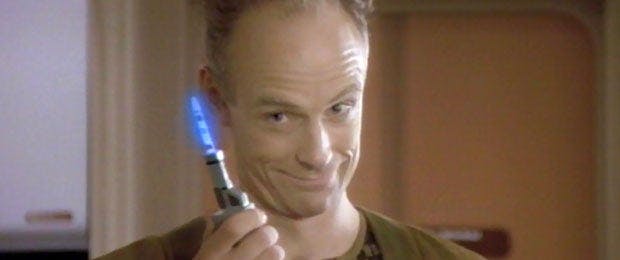
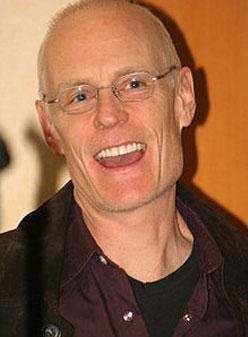
Here’s the truth: When you think of Matt Frewer, the first things that come to mind are Max Headroom, Watchmen, Honey, I Shrunk the Kids, Eureka and, these days, Falling Skies and Orphan Black. But, sure enough, he made a single – and memorable – appearance in the Star Trek universe, guest starring as the awesomely moniker-ed Berlinghoff Rasmussen, a time-traveling thief, in the Next Generation episode “A Matter of Time.” The generally comedic episode aired during TNG’s fifth season, way back in 1991, but it may as well as have been yesterday for the many fans who sat in on Frewer’s panel or greeted him at his table in the dealers’ room during Creation Entertainment’s Official Star Trek Convention in Las Vegas earlier this month.
Frewer enthusiastically shook hands, posed for pictures and signed photos of himself from his many genre outings; in fact, it seemed to be a dead heat between Star Trek and Max Headroom for most-frequently signed photos. During a rare lull in his line, Frewer took a few minutes to chat with StarTrek.com about his Trek experience and current projects. Here’s what he had to say:
Let’s start with the present. What are you working on these days?
FREWER: Well, let’s see. I’m about to go back to work on Orphan Black. My character is this corporate psychopath, somebody who will do anything and screw anyone over to get what he needs. He has zero empathy for anyone and sees everyone as a possible experiment in his petri dish. Tatiana Maslany is fantastic and the show is doing great on BBC America. I’m also doing a show (Witches of East End, debuting in October on Lifetime) with Julia Ormond. It’s a show about witches and I’m a vampire in that. And I may possibly be doing a Max Headroom reboot. So we’ve got our fingers crossed that that will happen.
Would the Max Headroom reboot be a one-off movie, a series, or something else?
FREWER: I don’t know. I think it would be a limited series. It’s not taken shape yet. It’s very early days. We’re still talking. Hopefully it’ll transpire.
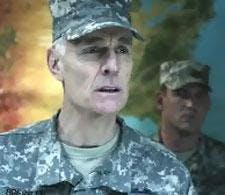
We really enjoyed your work on Falling Skies. How did that experience rate for you? You didn’t last very long…
FREWER: It was a lot of fun. They have great cast. I thought I had a premature demise, but every time I’m killed off I think I’ve had a premature demise. I’ll probably say that when I have a real demise. “This is premature.”
You’re pretty much the Michael Caine of television these days, the go-to-character actor. Can we assume you enjoy that status?
FREWER: Thank you very much for saying that. And, yes, absolutely, I enjoy it. I always thought the idea was that when you’re on your deathbed you could say you’d done lots of interesting things rather than you have a very expensive lining for your coffin. I would much rather do lots of different things and not be pigeonholed. I’ve always had a real phobia of being pigeonholed and being perceived as only able to do one thing.
How close did you come to being pigeonholed as Max Headroom?
FREWER: I don’t think it was that close because it was balanced out by the Edison Carter character, who was deeply serious. I wanted to make Edison much different from Max, and that was the joy of doing that show, that you got to see a guy and his doppelganger. In essence, it was a guy talking to himself and working that out, which is really what we all do in life anyway. So it was a pretty neat opportunity.
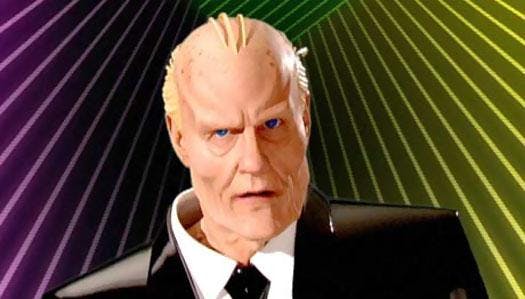
A lot of your work has been within the sci-fi realm. Are you a fan of the genre? Have you become a fan?
FREWER: I think I’ve become a fan of it. I don’t actively seek out sci-fi and I do lots of stuff in other genres, too, but sci-fi is intriguing because it puts characters in extreme circumstances. It’s like, “How are you going to react when you’re in the room with the alien?” You don’t really know until you get there. So you try not to see the guy in the rubber makeup until you actually do the scene. That way it’s a fresh reaction. That kind of stuff is neat. You have no frame of reference for it in real life. So it’s something that you really have to kick the imagination into gear for in order to fully realize it.
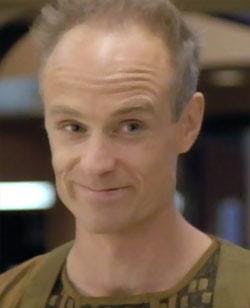
Let’s go back to TNG. Did you audition for “A Matter of Time” or was it an offer?
FREWER: That was an offer. They just asked me to do it. It was fantastic. I can’t honestly say that I was a huge Trekkie guy beforehand, but I became a fan of the people on the show afterward. One of the most difficult things for me was to drag myself away from lunch for work in the afternoon because I was having such a good time with people like Frakes and Spiner. It really was a lot of fun to be on that set.
We always got a big kick out of the character’s name, Berlinghoff Rasmussen…
FREWER: Anything that’s over 17 syllables, I’m into it.
What elements of the character did you appreciate most?
FREWER: Well, I loved the fact that he appeared likable but was really nefarious underneath it all. He was showing the world one thing, but was really something else. There was this gap between who he was and who he pretended to be, and that kind of thing is always fun to play. My character on Orphan Black is like that, too.
What else do you remember about the shoot?
FREWER: I just remember being excited to be on the good ship Enterprise and on the bridge. You kind of go, “Wow. This is the thing that everybody’s always talking about.”
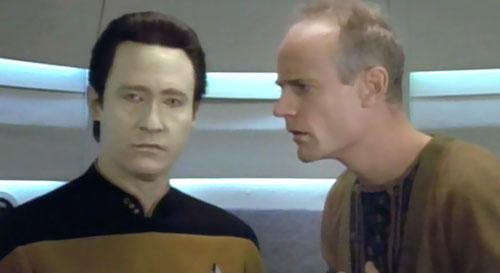
Last question: What did you make of the finished episode, and how cool/surreal is it that – 20-plus years later -- people are still interested in hearing about your experiences?
FREWER: I was very satisfied with the episode. We had good fun doing it. In the script, I was supposedly thrown into jail on a planet, and then they changed it and threw me into jail on the U.S.S. Enterprise. So I guess I’m still floating around up there in space, rotting in jail. That’s what I think happened, that they forgot about him and he’s just there, rotting away in jail. And, in terms of my being here (at the convention in Vegas), I think that’s entirely due to people like Gene Roddenberry and Shatner and Nimoy and all the guys from the early days who paved the way for people who just showed up even in one episode. They basically created something that was not only an icon, but it became an industry. The whole franchise is astounding, and it’s a huge honor to be part of that.
